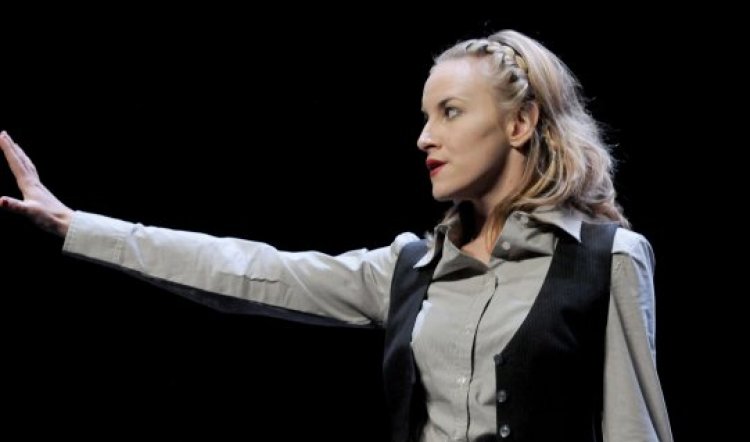
JULIUS CAESAR
JULIUS CAESAR, Bell Shakespeare Company, Playhouse Theatre, Sydney Opera House. October 27-November 26, 2011. Photos: Joe Sabljak: Kate Mulvany; and right: Colin Moody.
This stripped back version of Shakespeare's meditation on power, friendship and ambition alchemically distills the essence of conspiracy theory into practice. Adapted by Kate Mulvany, who also plays Cassius, it's saturated in unease, false smiles, treachery and other echoes of contemporary political events. Julius Caesar may be the title and the catalyst, but the central players and focus are his friends and allies, Cassius and Brutus.
Such an emphasis reveals the core of the play, and incidentally, the strength of the two actors – Colin Moody is a magnificent Brutus – as well as the restrained response to that shifted focus from Alex Menglet as Caesar. Little if anything is made of Cassius's gender switch, by the way, Cassius simply is. S/he is a febrile, Machiavellian presence, not precisely androgynous, nor exactly female or male, so that within minutes such questions of "who s/he?" become irrelevant and quickly forgotten.
What is relevant and constantly present is the evidence of how easily moral fibre is shredded in the face of ambition; and how quickly it can then be replaced by moral hazard. (Moral hazard: each party in a contract may have the opportunity to gain from acting contrary to the principles laid out by the agreement. Thanks for the succinct definition: Investopedia.) It is these inner machinations and motives of the play that are revealed by the Mulvany slice-n-dice; extraneous characters have disappeared and what is left is something much more frightening and malevolent than mere physical violence.
The ironies are exquisite: Cassius is steadfast in treachery; Brutus is reliable in murder; their friendship is as faithful as their ambition is relentless and, finally, corruptible. The baying mob is their guiding light and principle. Directed by Peter Evans in close collaboration with movement-choreographer-fight director Nigel Poulton, this Caesar is a stylised semi-pavane, with the actors entering and leaving the playing space with a conscious pause and change of pace. It punctuates and disrupts – whether or not you like it possibly depends on whether the unheard music appeals or not. Before reaching Sydney – its final stop – the production has been on the road around the country since June. It seems that the company's energy and conviction is bound up in the "dance" – both verbal and physical – and the result is startling freshness and sureness.

The setting (Anna Cordingley) is ancient Rome-meets-the-boardroom, or perhaps the cabinet room of a modern parliament. A graceful, imposing yet time-worn pediment-topped column signifies faded power and glory; its current plight suggested by scaffolding and tape. Is the column being protected from the rabble, or the public being protected from the crumbling column? You decide; either way it stands in one corner, impervious or ignored, like so many once-powerful entities. Murder, when it comes is pre-destined and pre-packaged – no blood, just ashes to ashes and dust to dust. History and Shakespeare as shorthand: we know the story, we don't need our hands held.
The company works well in the main: Keith Agius, Rebecca Bower, Daniel Frederiksen, Benedict Hardie, Katie-Jean Harding, Gareth Reeves and James Wardlaw. It's churlish to carp at this late date, but Fredericksen's Mark Antony seems unconvinced and unconvincing. However, the centre holds, things do not fall apart, because the best lack all conviction, while the worst are full of passionate intensity; and the centre is Mulvany and Moody. Their conviction in being equivocal is total; it's a memorable and fierce partnership.



